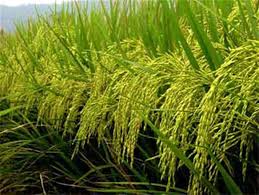Revamping the Gezira Scheme: Sudan Seeks Food Security with Rice
 A single grain of rice can tip the scale. It may also contribute to the realisation of food security in Sudan where, according to UN estimates, up to 12% of the population may need some form of nutritional assistance.
A single grain of rice can tip the scale. It may also contribute to the realisation of food security in Sudan where, according to UN estimates, up to 12% of the population may need some form of nutritional assistance.
Rice is a latecomer to the Gezira farming region between the Blue and White Nile just south of Khartoum. Here the new crop is being hailed as a possible harbinger of much better times with excellent yields that allow farmers to almost triple their incomes.
Al Jazirah state minister for agriculture Abdullah Mohammed Osman doesn’t hesitate to describe rice as a potential wonder-crop: “Traditional cropping systems have failed in Gezira. They lack economic feasibility. However rice is doing much better than we had expected.”
A Japanese development project brought rice to the Gezira Scheme, a vast region irrigated through gravity by the waters of the Blue Line. The Scheme is one of the world’s largest irrigation projects, covering well over 8,000 square kilometres of exceptionally fertile clay soils. The area is crisscrossed by a maze of canals and ditches with a total length of about 4,300 km.
“Traditional cropping systems have failed in Gezira. They lack economic feasibility. However rice is doing much better than we had expected.”
Traditionally Gezira produced sorghum, groundnut, millet, wheat and cotton. However backlogged maintenance work on some canals has seen yields plummet and farmers move elsewhere. In 2010, the Japan International Cooperation Agency (JICA) stepped in to help local authorities stem this tide.
A first generation of 70 Sudanese agricultural engineers have been trained in the techniques of rice cultivation. They are now spreading the word to Gezira’s farmers who already report encouraging results. “Rice yields are now up to three tons per hectare. This is more than double the yield of wheat. Farmers can expect to cash up to 600 euros annually per hectare of rice compared to barely a third of that for the best of other crops,” says Agriculture Minister Osman.
The Sudanese government now aims to end the experimental phase of the development project and move into big-time rice production. The idea is to have Gezira farms first supply the domestic market with the 50,000 tons of rice needed annually and then turn the crop into export cash earner.
At his office in state capital Wad Medani, Mr Osman explains that Sudan currently spends about €11 million on rice imports each year: “We now realise that it is by no means impossible to grow this rice domestically.” JICA has already supplied planting and milling equipment and is in the process of helping Sudan set up the necessary infrastructure to secure a stable supply of seed and herbicides.
Japanese project manager Osamu Nakagaki emphasizes that the introduction of a new crop entails much more than merely sticking a few seeds in the ground: “We also need to put de-husking and packaging equipment in place and ensure proper and timely transportation in order to actually get the crop to the end-consumer as a finished product.”
The Gezira Scheme originated in colonial times when British administrators noted the banks of the Blue Nile gently sloping downward. It occurred to them that this particular topographic feature, in conjunction with the firm clay soils of the region, was ideal for the implementation of a gravity-fed irrigation scheme. The clay soil helps minimize water seepage. Initially the Gezira Scheme was to produce wheat but it was soon discovered that the area was especially well-suited for the cultivation of cotton, at the time a much more valuable crop.
With their emphasis on providing food security for a nation of 31 million, both the national government of Sudan and local authorities in Al Jazirah are confident that rice cultivation is an important – if not essential – part of the solution.
Minister Osman explains that the state will limit its role to providing solid guidance and technical assistance: “Initially we’ll also provide the seed and herbicides needed to get production off to a good start. However private farmers are the ones who will need to grab this opportunity to provide for their families and for the country as a whole.”
You may have an interest in also reading…
Ambareen Musa, Founder & CEO of Souqalmal: From Mauritius with Love for Fintech, and lots of Ambition
Ambareen Musa, founder and CEO of financial aggregator marketplace Souqalmal, sees a glowing future for fintech — and she believes
Business in Times of Corona: The Human Factor
War, pestilence, and other major calamities that threaten to rip apart the fabric of society, usually bring out the best
Green is the New Gold: Sustainability Takes Centre Stage in the Middle East
Digitalisation is a key part in the puzzle to unlock value — and save the planet at the same time.

















































































